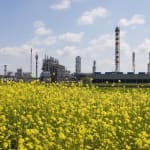
Today, MOL Group announced its financial results for Q4 and full year 2021. In a very volatile external environment, MOL Group generated USD 947mn Clean CCS EBITDA in Q4, bringing full-year Clean CCS EBITDA to an all-time high USD 3.531bn, above the updated guidance. Simplified free cash flow tripled since last year and amounted to USD 1,988mn, mainly driven by the favorable oil and gas prices and refinery/petrochemical margins. This result allows MOL to fund its ongoing and planned transformational projects. MOL expects 2022 EBITDA to reach or even exceed USD 2.8bn.
Chairman-CEO Zsolt Hernádi commented the results, “I am proud that MOL Group significantly outperformed the upgraded guidance and delivered an all-time high EBITDA of USD 3.5bn in 2021. Due to MOL’s integrated business model and the good internal performance we were able to maximize the benefits from the external environment, allowing us to fund our transformational investments.
“Despite the operational challenges we continued our strategic transformational journey that we accelerated with the Shape Tomorrow 2030+ Strategy update one year ago. The construction of the new polyol complex proceeded according to plan, and we also took inorganic steps to strengthen our Consumer Services portfolio in Poland and Slovenia. We expect that the external environment will remain volatile and unpredictable in 2022. Against this macro backdrop we expect MOL’s EBITDA generation to reach or even exceed USD 2.8bn this year.”
Upstream: 2021 Q4 clean EBITDA jumped by 184% to USD 513mn from the 2020 lows, bringing full-year Upstream EBITDA to USD 1.554bn, nearly half of MOL Group’s total results. The great performance was driven by the 70% uplift of Brent oil price and the 3.5 times higher gas prices compared to last year. Simplified free cash flow significantly improved to USD 399mn in Q4, bringing Upstream’s simplified free cash flow generation to USD 1.15bn in 2021. Annual oil and gas production remained above 110 mboepd that meets the group-level target, ACG asset in Azerbaijan positively contributed to the volumes while natural decline continued mainly in Central and Eastern Europe and in the UK.
Photo: MOL Group



